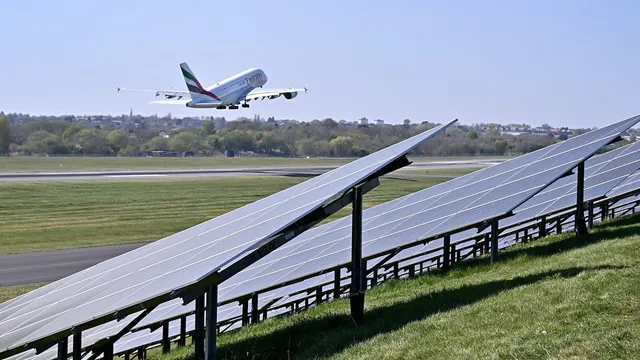
Birmingham airport achieves solar energy milestone for peak daytime power
2025-07-03 11:17- Birmingham Airport invested nearly £10 million to construct a solar farm in 2024, featuring over 12,000 panels.
- The solar array has saved 1,070 tonnes of carbon emissions and can power 2,000 homes annually.
- The airport aims to achieve net-zero carbon emissions by 2033, showcasing its commitment to environmentally sustainable energy.
Express your sentiment!
Insights
Located in the United Kingdom, Birmingham Airport has recently made significant strides towards sustainability by fully powering its peak daytime energy requirements with solar energy. This achievement follows an investment of nearly £10 million in a solar farm, completed in 2024, which includes over 12,000 solar panels. Additionally, a lightweight solar film installation of 90 kWh on the roof of the North Terminal has further enhanced the airport's solar energy capabilities by improving energy efficiency and reducing heat through light reflection. The airport's commitment to renewable energy began in 2012 when it first installed traditional solar panels on its terminal roof. Over the years, the efforts to harness solar power have been part of a broader strategy to decrease reliance on the electrical grid and mitigate the effects of fluctuating market prices for electricity. Simon Richards, the chief finance and sustainability officer at Birmingham Airport, emphasized that the solar array not only contributes to energy generation but also significantly minimizes carbon emissions. Since its activation, the solar array has prevented the emission of 1,070 tonnes of carbon and has successfully operated at 100 percent capacity during peak energy requirements on 50 occasions. This remarkable transition to solar energy aligns with Birmingham Airport's ambitious plan to achieve net-zero carbon emissions by 2033. Simon Richards articulated the airport's determination to improve sustainability while addressing the inherent carbon intensity of the aviation industry. Collaborative efforts are also being made with airlines to reduce carbon emissions from flights. The installation of solar energy infrastructure has resulted in the generation of around six gigawatt-hours (GWh) of power each year, a volume sufficient to supply energy to more than 2,000 homes. As sustainability becomes increasingly critical in the aviation sector, Birmingham Airport's initiatives exemplify the industry's potential for reducing environmental footprints. Airports across the United Kingdom are beginning to follow suit, with Stansted Airport announcing plans for its own solar power farm in January of the same year as part of a broader £1.1 billion investment to enhance and expand its facilities. The success of Birmingham Airport’s solar implementation underscores the growing trend of airports committing to cleaner energy sources, making significant contributions toward more sustainable aviation practices.
Contexts
As climate change continues to pose significant risks to the environment and public health, UK airports are taking noteworthy steps towards sustainability by 2025. Recognizing the need for responsible growth, airports are implementing a range of sustainability initiatives aimed at reducing their carbon footprint and enhancing overall efficiency. These initiatives encompass various aspects of airport operations, including the use of renewable energy, waste reduction strategies, and improvements in transportation services. By leveraging new technologies and fostering collaborations, UK airports are positioning themselves as leaders in the shift towards greener travel options. One significant avenue airports are exploring is the transition to renewable energy sources. Many airports are investing in solar and wind energy facilities to power their operations. For instance, some airports have begun partnerships with local renewable energy providers to source energy from wind farms or solar installations in their proximity. This shift not only reduces reliance on fossil fuels but also lowers operational costs in the long run. Additionally, airports are implementing energy-efficient technologies in terminal buildings, such as LED lighting and advanced HVAC systems, which not only decrease energy consumption but also improve passenger comfort. Waste management is another critical focus for UK airports as part of their sustainability initiatives. Strategies have been put in place to minimize waste generation and enhance recycling efforts across airport facilities. Initiatives include the establishment of comprehensive recycling programs that encourage both passengers and personnel to recycle materials effectively. Moreover, airports are working with their retail and catering partners to minimize single-use plastics, opting for reusable or biodegradable alternatives. These efforts not only address environmental concerns but also align with growing consumer expectations for sustainable practices in travel and hospitality. Finally, improvements in ground transportation services are essential for ensuring that airport sustainability initiatives are successful. Many UK airports are enhancing their public transport links, making it easier for travelers to access terminals through buses, trains, and other efficient transit options. Additionally, electric and hybrid vehicle infrastructure is being developed to encourage the use of low-emission vehicles among airport staff and passengers. As a result of these combined efforts, UK airports are not only striving to meet immediate sustainability targets but are also working towards a long-term vision of environmentally responsible aviation that can adapt to evolving challenges in the future.